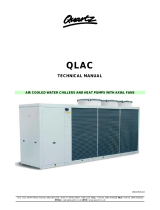
5
VMBMD302
1 Important information
⚠
This appliance is not intended for use by persons
(including children) with reduced physical, sensory
or mental capabilities, or lack of experience and
knowledge, unless they have been given supervision
or instruction concerning use of the appliance by a
person responsible for their safety.
⚠
Children should be supervised to ensure that they
do not play with the appliance.
⚠
The installation must only be carried out by an
authorized installer with reference to applicable
rules and orders and these installation instructions.
⚠
The heat pump must be located in a frost-free envi-
ronment!
⚠
The floor must be able to support the gross weight
of the heating installation.
⚠
The heating installation must be placed on a stable
surface.
⚠
Before the heat pump is supplied with voltage you
must ensure that the heating system and coolant
system, incl. the heat pump, are filled and bled of air
otherwise the circulation pumps can be damaged.
⚠
If the electrician wishes to test his connections
before the above is carried out this should only done
when it has been checked that the heat transfer fluid
and coolant pumps have been disconnected.
⚠
When filling the coolant system the coolant pump
must be operating but one must ensure that the
compressor and the heat transfer pump cannot start.
The coolant pump can then be run manually using
a separate switch which is located on the electrical
cabinet.
⚠
When filling is complete the coolant pump must be
put in Auto mode.
1.1 Refrigerant
The heat pump’s cooling system (refrigerant circuit) is
filled with R407C or R134a (depending on version) refrig-
erant.
Work on the refrigerant circuit must only be carried
out by a certified engineer!
Fire risk
R407C/R134a are not combustible or explosive in normal
conditions.
Toxicity
In normal use and normal conditions the refrigerant has
low toxicity. However, although the toxicity of the refriger-
ant is low, it can cause injury (or be highly dangerous) in
abnormal circumstances or where deliberately abused.
The refrigerant vapour is many times heavier than air and
in enclosed spaces, below the level of the door for exam-
ple, and in the event of leakage, large concentrations can
occur with the risk of suffocation because of lack of oxy-
gen. Spaces in which heavy vapour can collect below the
level of the air must therefore be well ventilated.
Refrigerant exposed to a naked flame creates a poi-
sonous irritating gas. This gas can be detected by its
odour even at concentrations below its permitted
levels. Evacuate the area until it has been sufficiently
ventilated.
Anyone with symptoms of poisoning from the vapour
must immediately move or be moved into the fresh air.
Work on the refrigerant circuit
When repairing the refrigerant circuit, the refrigerant
must not be released from the heat pump – it must be
destroyed at a special plant. Draining and refilling must
only be carried out using new refrigerant (for the amount
of refrigerant see manufacturer’s plate) through the serv-
ice valves. All warranties from Danfoss Heat Pumps are
void if, when filling with refrigerant other than R407C or
R134a, it has not been notified in writing that the new
refrigerant is an approved replacement refrigerant togeth-
er with other remedies.
Scrapping
When the heat pump is to be scrapped the refrigerant
must be extracted for destruction. The local regulations
for treatment of refrigerant must be followed. See the rel-
evant Swedish Environmental Protection Agency refriger-
ant statutes.
1.2 Noise and vibrations
From the sound and vibration point of view it is important
that the pipe mountings in the ceiling and walls are made
with vibration damping fastenings and that the holes for
lead-ins in the walls are made as large as possible so that
sound and vibration do not spread.
If the house has poor acoustics, special care must be taken
so that the vibrations do not spread into the building.
In such cases no mountings may be made in the house
near the heat pump. All mountings must be in free stand-
ing constructions, which themselves are in vibration
damping material such as Solodyn.
In those cases where the coolant side must be mounted
to the building, flexible hoses should be used, although
not the same type as the heat transfer pipes. Flexible
hoses for the heat transfer and hot gas must be extra long
(600 mm or longer) and connected at 90°. If one suspects
that the floor on which the heat pump is located may
transfer vibration to the rest of the building, the heat
pump must be positioned on Solodyn pads. These pads
must be weight adapted. Always consult the representa-
tive from Danfoss Heat Pumps in these cases.



















